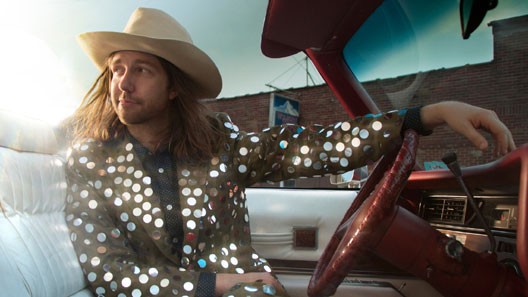

|
|
|
Whether playing guitar in the late incarnation of riotous glam-rock innovators the New York Dolls, the gender-bending, envelope-pushing sleaze n’ tease arena rock band Semi Precious Weapons, the Neil Young-signed alt-country act Everest, British roots rock band Alberta Cross, Southern rock stalwarts Drivin’ N’ Cryin’ or even as frontman of the devilishly cleverly-named Heartbreakers meets Replacements rockers Madison Square Gardeners, East Nashville-based musician Aaron Lee Tasjan has always considered himself a songwriter first and foremost, writing his own off-kilter folk-inflected songs since he picked up his first acoustic as a teen guitar prodigy. “A lot of the stuff I did previously was never the main focal point,” Tasjan explains. “It’s all just been pieces along the way.”
While those stints may have never been his main destination, each one has been a stepping stone that has uniquely informed his songwriting and made him a compelling, singular artist. Tasjan’s songs, as first heard on his debut solo EP, 2014’s Crooked River Burning, are indebted to great American storytellers like John Prine, Tom Petty, Guy Clark, Steve Goodman, Arlo Guthrie and Todd Snider. They are imbued with wry wit, a sharp tongue and a lot of heart.
Last year’s self-released LP, In The Blazes, received accolades from American Songwriter, Rolling Stone, Nashville Scene and NPR and suggested Tasjan was an artist to keep an eye on, especially on the strength of album standout, “E.N.S.A.A.T.” The biting gentrification ballad, with its refrain of “Move out to East Nashville and write a song about a train,” got tongues wagging, with the Scene describing it as “an eye roll at the notion of musical posturing,” and NPR writing in its premiere of the song, “His critique of the Americana music biz is woven within a truly poignant first-person account of the working artist's daily struggle. ‘You can't turn away from your own two feet, or give away what's not yours to keep,’ Tasjan croons in his broken tenor, over a slowly steamrolling guitar line. That's some eternal truth to drop on a changing Nashville landscape.”
While that album hinted at Tasjan’s enormous potential, it’s his sophomore effort, his New West Records debut, Silver Tears, that best realizes his artistic ambitions and solidifies him as one of the most intriguing singer/songwriters to emerge in sometime. An inspired and confident set of songs, the 12-track album, which features a cover with Tasjan decked out in a reflective suit and Stetson, careens from woozy pot paeans to brooding, cinematic observations to laid back ‘70s country-rock and galloping anthems to introspective folk and rollicking honky tonk. “I might have made something that will surprise people,” Tasjan admits. “I didn’t completely abandon the recipe, but I really stretched myself and pushed beyond what people might expect from me. Being true as a musician, I’m not just one thing – and a variety of styles is a way to accomplish that."
For Silver Tears, Tasjan decamped from Tennessee to Southern California, trading Nashville’s icy winter for Los Angeles’ eternal sunshine in February 2016. Like he did on In The Blazes, he enlisted producer and Father John Misty bassist Eli Thomson to helm the production and together they assembled a group of accomplished musicians that included solo artist David Vandervelde on guitar and lap steel, Max Hart on piano and organ, Charlie Peterson on cornet, trumpet and saxophone and drummers Frank Lenz and Dan Bailey on drums and other assorted percussion. Thomson also manned bass and synth. Splitting their time between several studios, the band laid down part of the album at New Monkey, the famed studio in the gritty LA enclave of Van Nuys where Smith recorded his final album,From A Basement On The Hill, and at Sonikwire Studios in Irvine and Club Casino in Huntington Beach. “Romantically, I had the idea of Tom Petty in the studio, jamming, trying to capture different feels and see where the day was,” Tasjan reveals. I wanted it to be live, to have that intensity that draws people in.”
Petty’s influence, one that caught hold of Tasjan when he first discovered Full Moon Fever as a teenager growing up in Ohio, can be heard in Tasjan’s similar relaxed delivery and nuanced phrasing as well as the album’s varied sounds. Whether the Traveling Wilburys-esque “Dime,” the slink Petty nod “Till The Town Goes Dark” or the plaintive, pedal steel-drenched “On Your Side,” the Gainesville swamp bleeds through. But there also are echoes of Harry Nilsson’s quirky playfulness on album opener, “Hard Life,” and “Little Movies” brings to mind Jeff Lynne and Elliott Smith. Smith is again evoked in the echoey guitar part and “ooh-ooh-ooh” harmonies of the aforementioned “Till The Town Goes Dark,” begging the question, does Smith’s ghost hang out in the hallowed halls of his old studio? Neil Young and Crazy Horse can be heard in “Refugee Blues’” mid-song crescendo while “Success” reminds of Allen Toussaint’s carny barkery and “12 Bar Blues” of Todd Snider’s tongue-in-cheek talking blues.
While Tasjan’s masterful, eclectic songwriting is on full display throughout the album, his spirited guitar playing never takes a backseat. Instead, the acclaimed guitarist, who was named Distinguished Guitarist at the prestigious Ellington Competition at Carnegie Hall as a teenager and who was awarded a jazz-guitar scholarship to the esteemed Berklee College of Music but who fled to Brooklyn after he decided he wanted to do things on his own, tastefully delivers exactly what each song calls for, from hard-strumming acoustics to psychedelic flourishes to feedback-filled freakouts and twangy licks. There’s an edge that comes out in his playing when he really attacks the guitar that could only come from a Midwestern adolescent raised on punk and what used to be called college rock. “I love the bands of the late ‘80s and ‘90s like Dinosaur Jr., Husker Du, The Replacements, all those groups from Minneapolis, Tasjan enthuses. “The two things I listen to the most are those kind of more punk rock bands and songwriter stuff, that’s where that comes together for me. There’s a lot of similarities, there’s underlying social commentary to it, it works on several levels, it engages my mind. At the end of the day I like good songs that are played passionately.”
Silver Tears was written over the last year, in between and on tours with Ray Wylie Hubbard, John Moreland, Lilly Hiatt and the Legendary Shack Shakers, which would end up being especially fortuitous. Tasjan, who is no stranger to mind-expanding substances, having written most of the aptly-named In The Blazes in a cloud of marijuana smoke, had a chance encounter with a fan that greatly influenced the record. “At a show in Omaha, a guy in the crowd gave me a wadded up napkin that he said I needed. I had forgotten about it but found it awhile later in the pocket of the jacket I was wearing that night,” he recalls. “As it turned out, the napkin had a couple of hits of acid in it. I decided to try this thing called microdosing where you just take little bits all day long, and stay suspended in this slightly altered state. I set up a studio in my living room to record on garage band, went with a classic tambourine/duct tape drum set... suspended a RadioShack mic from the ceiling fan. You know, the essentials. It was amazing and in a creative burst I wrote ‘Little Movies,’ ‘Ready To Die,’ ‘Dime’ and ‘Where The Road Begins and Ends’ all that day.”
Of course not all songs on the record came to Tasjan in a chemically-induced state. “Till The Town Goes Dark,” a song about coming to terms with the future not delivering on its lofty ambitions, was written towards the end of recording in a fit of inspiration. “Frank Lenz and I were driving around and he said the opening line of ‘All we got were TV's in our pockets after being promised rocket ships and flying cars,’ Tasjan offers. “When we got back to his apartment I went in the bedroom and wrote the rest of it looking out of his bedroom window: “One day, they said the future/Was flying cars and a ride on a rocket/Time passed and all I got/Was America today and a TV in my pocket.” “Little Movies” came from pictures he was seeing in his mind. “All those images and the sound of the record worked because it was more melancholic, more beautiful sadness. But also more musical in different ways than expected.”
The gently romantic country-rock tune “Memphis Rain” is half dream, half reality. “I had a dream that late, great Memphis musician, Jay Reatard was singing ‘In the Memphis rain’ on this motorcycle that was on fire. A few days later I played a show at Lafayette’s in Memphis and right before the gig, this lady at the bar was really tearing into me, said she was a jujitsu instructor, could sleep with her eyes open and a descendant of her family was pictured on the Indian head nickel, just really wild stuff. There was a big window looking out onto the street from the bar and during my whole set I watched her standing out in the pouring rain arguing with her boyfriend who kept his motorcycle running the entire time I played. It was a really beautiful and strange moment so I wrote it into the song.”
“I can’t say unequivocally there was a particular thing on my mind when I wrote about this album but when I listen back to it there’s a lot of social commentary on there,” Tasjan confesses. “If there’s a theme to the record it’s just having something to say. These things that are happening in America right now aren’t just fantastical, strange surreal things, they’re things people are really going through and people are connecting with them in a big way. That’s certainly part of the development of society. Everybody has some member of their family that has to deal with gay and straight issues we face in America; they might have a family member that is transgender. I really love people and feel very vested in humanity, I believe in people a great deal. I want to speak to all the stuff I’ve been thinking about as I feel it’s stuff that affects everyone.”
As in the song “On Your Side,” which sees Tasjan warble, “I sing jokes/And call 'em songs/Nobody knows where they belong/I've come up short/For far too long/And what felt right/Now feels so wrong,” Tasjan often turns the mirror on himself, never afraid to cast himself in a negative light. “One of the reasons I’ve been able to connect with people is by being honest and saying this is a really realistic picture of who I am,” he says. “It’s not always the good but it’s me.”
Tasjan points to an unlikely hero of his as someone he would like to model his career after. “I would love to be the Miley Cyrus of folk singers,” he declares. “I’d love people to feel they can be as free and weird as they are. That’s my favorite thing about her. I love the spirit of what she brings and how she uses her platform to empower people. I want to be the kind of dude where some kid who grew up in a little town in Ohio can feel, if they saw me singing or heard my album, that they could do whatever they wanted to do and transcend their surroundings.”
| Date | Venue | City | State | Note |
|---|---|---|---|---|
| No Tour Dates Available | ||||